人教八年级上册Unit2知识点
八年级上人教版Unit2知识点大全

知识点大全SA重要动词词组help with housework 帮忙做家务, read 阅读, read English books 读英语书,exercise 锻炼, watch TV 看电视, go shopping 去购物, go to the movies 去看电影,shop 购物,use the internet 使用互联网,基本句型1What do you do on weekends? 你周末做什么?I always/usually/often/sometimes watch TV.What does he/she do on weekends?He/She always/usually/often/sometimes helps with housework.分析:试分析句子结构。
基本句型2Do you exercise?简略肯定:Yes, I do.完整肯定:Yes, I usually/often/sometimes exercise.简略否定:No, I don’t.完整否定:No, I never/hardly ever exercise.分析:试分析句子结构。
思考:如果针对he/she提问,应该怎么问与答?语法:关于频率副词频率副词:一般用来表示动作或状态发生的频率。
用法:助动词/Be动词/情态动词之后,实意动词之前。
根据动作发生的频率由大到小排列依次为:always(总是)> usually(通常)>often(经常,常常)>sometimes(有时)>hardly ever (几乎不)>never (从不)重要辨析:hardly ever与hardly1)hardly ever是频率副词,用于描述动作或状态的频率。
e.g. I am hardly ever late for school. 我上学几乎不迟到。
e.g. Jack hardly ever does his homework. 杰克几乎不做作业。
人教版英语八年级上册Unit2 知识清单
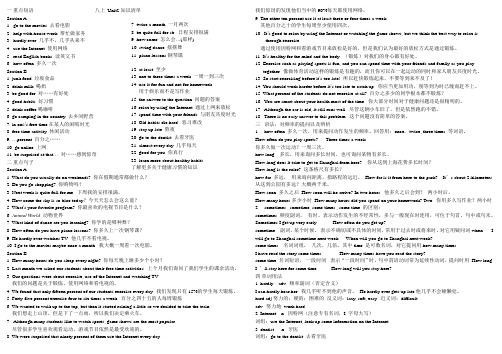
一.重点短语 八上 Unit2知识清单 Section A1. go to the movies 去看电影2. help with house work 帮忙做家务3. hardly ever 几乎不,几乎从来不4. use the Internet 使用网络5. read English books 读英文书6. how often 多久一次Section B1. junk food 垃圾食品2. drink milk 喝奶3. be good for 对……有好处4. good habits 好习惯5. drink coffee 喝咖啡6. go camping in the country 去乡间野营7. in on e’s free time 在某人的闲暇时光8. free time activity 休闲活动9. …percent 百分之……10. go online 上网11. be surprised at/that … 对……感到惊奇二.重点句子Section A1. What do you usually do on weekends? 你在假期通常都做什么?2. Do you go shopping? 你购物吗?3. Next week is quite full for me. 下周我的安排很满。
4. How come the sky is so blue today ?今天天怎么会这么蓝?5. What ’s your favorite program? 你最喜欢的电视节目是什么?6. Animal World 动物世界7. What kind of dance are you learning? 你学的是哪种舞? 8. How often do you have piano lessons? 你多久上一次钢琴课? 9. He hardly ever watches TV. 他几乎不看电视。
人教版八年级英语上册Unit 2重要知识点讲解

Unit2How often do you exercie?重要知识点讲解惯用法:1. help sb. with sth 帮助某人做某事2. How about…? ….怎么样?/ ….好不好?3. want sb. to do sth. 想让某人做某事4. How many + 可数名词复数+ 一般疑问句….有多少…..5. 主语+ find+ that 从句…发现…6. It’s + adj.+ to do sth. 做某事是….的7. spend time with sb. 和某人一起度过时光8. ask sb. about sth. 向某人询问某事9. by doing sth. 通过做某事10. What’s your favorite…..? 你最喜欢的……是什么?11 start doing sth. 开始做某事12. the best way to do sth.做某事的最好方式词语辨析:1. how often 多久一次,用来提问动作发生的频率。
回答用:once,twice, three times 等词语。
How often do you play sports? Three times a week.how long 多长,用来询问多长时间,也可询问某物有多长。
How long does it take to get to Shanghai from here? How long is the ruler?how for 多远,用来询问距离,指路程的远近。
How far is it from here to the park? It’s about 2 ki lometers.2.free 空闲的,有空的,反义词为busy.be free 有空,闲着,相当于have time.I’ll be free next week. = I’ll have time next week.还可作“免费的、自由的”解。
Unit2单词知识点讲义人教版英语八年级上册

2023年人教版初中英语八年级上册Unit 2单词知识点讲解(讲义)1 houseworkn.【u】家务事;家务劳动do the houseworkHousework is a never-ending task.She always helps with the housework.2 hardlyadv.几乎不,几乎没有There is hardly any tea in the bottle.We hardly know each other.用于can或者could后表示很难I can hardly keep my eyes open.我都快睁不开眼了。
同义词seldom几乎不3 everadv.从来;任何时候(否定句,疑问句和if引导的句子)Nothing ever happens here.这儿几乎没发生过任何事。
adv.总是;曾经It was raining harder than ever.当下下着前所未有的大雨。
4 hardly ever表示频率非常低,几乎不会发生I hardly ever go to concerts.I hardly ever eat fish.She hardly ever exercises.5 onceadv.一次;仅一次I’ve only been there once.我只去过那里一次。
She cleans his car once a week.她一个周洗一次车。
adv.曾经I once met your mother.The book was once famous, but nobody reads it today.conj. 一旦The water is fine once you’re in.你一旦下了水,就觉得水里很舒服。
at once 立刻;马上once again再一次once more 又一次;再一次once upon a time 从前;很久以前6 twiceadv.两次They go there twice a month.adv.两倍Cats sleeps twice as much as people.猫睡觉的时间比人长一倍。
人教版八年级英语上册Unit2知识点汇总总结
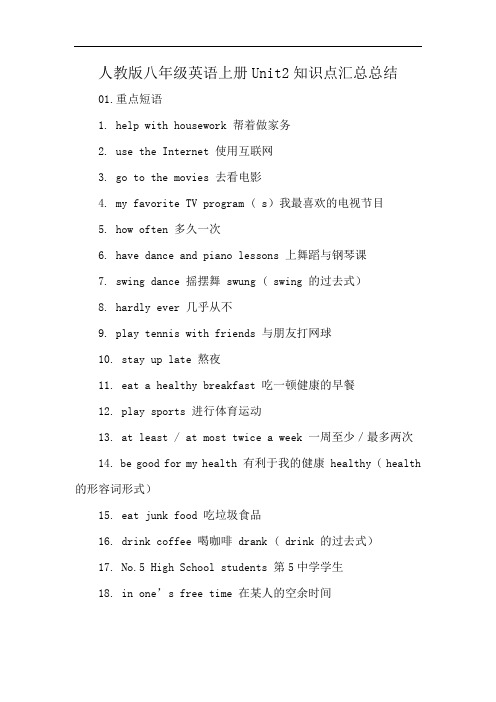
人教版八年级英语上册Unit2知识点汇总总结01.重点短语1. help with housework 帮着做家务2. use the Internet 使用互联网3. go to the movies 去看电影4. my favorite TV program ( s)我最喜欢的电视节目5. how often 多久一次6. have dance and piano lessons 上舞蹈与钢琴课7. swing dance 摇摆舞 swung ( swing 的过去式)8. hardly ever 几乎从不9. play tennis with friends 与朋友打网球10. stay up late 熬夜11. eat a healthy breakfast 吃一顿健康的早餐12. play sports 进行体育运动13. at least / at most twice a week 一周至少/最多两次14. be good for my health 有利于我的健康 healthy ( health 的形容词形式)15. eat junk food 吃垃圾食品16. drink coffee 喝咖啡 drank ( drink 的过去式)17. No.5 High School students 第5中学学生18. in one’s free time 在某人的空余时间19. ask them about their free time activities 询问他们关于他们的业余活动20. not … at all 根本不…21. go online 上网22. be surprised that ..感到惊讶23. use it for fun 为了取乐而使用它24. the answers to the questions 这些问题的答案25. one to three times a week 一周一到三次26. two percent of the students 2%的学生27. the best way to do sth.做某事的最好方式28. such as 例如29. spend time with your friends 与你的朋友共度时光spent ( spend 的过去式)30. spend time on sth./ in doing sth.花时间在某事上/做某事31. play together 一起玩32. watch TV for over 2 hours 看两个多小时电视33. go to the dentist 去看牙医34. a 16-year-old high school student 一名16岁的中学生35. have a lot of good habits 有许多好习惯36. more / less than two hours 多/少于两小时37. go to the dentist for teeth cleaning 去牙医处清洁牙齿38. go to the shopping center 去购物中心02.重点句子语法聚焦1. --What do you usually do on weekends?你在周末通常做什么?--I always exercise.我总是锻炼。
人教版八年级上册英语Unit2How often do you exercise知识点
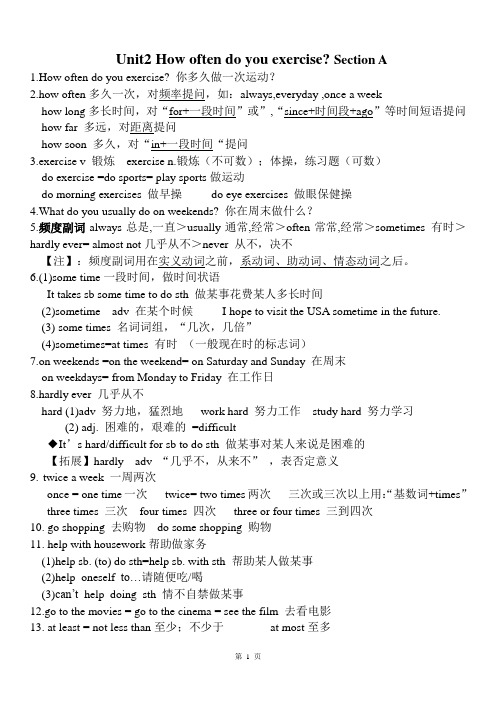
Unit2 How often do you exercise? Section A1.How often do you exercise? 你多久做一次运动?2.how often多久一次,对频率提问,如:always,everyday ,once a weekhow long多长时间,对“for+一段时间”或”,“since+时间段+ago”等时间短语提问how far 多远,对距离提问how soon 多久,对“in+一段时间“提问3.exercise v 锻炼exercise n.锻炼(不可数);体操,练习题(可数)do exercise =do sports= play sports做运动do morning exercises 做早操do eye exercises 做眼保健操4.What do you usually do on weekends? 你在周末做什么?5.频度副词always总是,一直>usually通常,经常>often常常,经常>sometimes 有时>hardly ever= almost not几乎从不>never 从不,决不【注】:频度副词用在实义动词之前,系动词、助动词、情态动词之后。
6.(1)some time一段时间,做时间状语It takes sb some time to do sth 做某事花费某人多长时间(2)sometime adv 在某个时候I hope to visit the USA sometime in the future.(3) some times 名词词组,“几次,几倍”(4)sometimes=at times 有时(一般现在时的标志词)7.on weekends =on the weekend= on Saturday and Sunday 在周末on weekdays= from Monday to Friday 在工作日8.hardly ever 几乎从不hard (1)adv 努力地,猛烈地work hard 努力工作study hard 努力学习(2) adj. 困难的,艰难的=difficult◆It’s hard/difficult for sb to do sth 做某事对某人来说是困难的【拓展】hardly adv “几乎不,从来不”,表否定意义9.twice a week 一周两次once = one time一次twice= two times两次三次或三次以上用:“基数词+times”three times 三次four times 四次three or four times 三到四次10.go shopping 去购物do some shopping 购物11.help with housework帮助做家务(1)help sb. (to) do sth=help sb. with sth 帮助某人做某事(2)help oneself to…请随便吃/喝(3)can’t help doing sth 情不自禁做某事12.go to the movies = go to the cinema = see the film 去看电影13. at least = not less than至少;不少于at most至多14. use the Internet 上网15.What’s your favorite program?=What program do you like best?你最喜欢的节目是什么?16.every day 每天= each day 做状语,放在句末,对其提问用how ofteneveryday = daily adj. 每天的,作定语,修饰名词,放在名词之前He exercises every day. 他每天都锻炼。
人教八年级上册英语unit2知识点总结彩色版
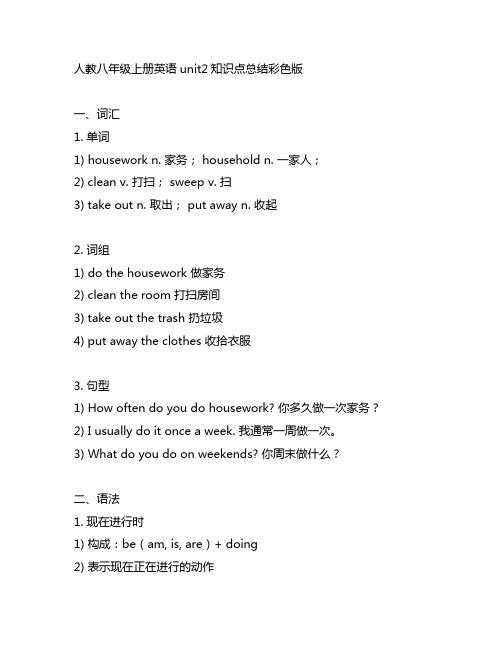
人教八年级上册英语unit2知识点总结彩色版一、词汇1. 单词1) housework n. 家务; household n. 一家人;2) clean v. 打扫; sweep v. 扫3) take out n. 取出; put away n. 收起2. 词组1) do the housework 做家务2) clean the room 打扫房间3) take out the trash 扔垃圾4) put away the clothes 收拾衣服3. 句型1) How often do you do housework? 你多久做一次家务?2) I usually do it once a week. 我通常一周做一次。
3) What do you do on weekends? 你周末做什么?二、语法1. 现在进行时1) 构成:be(am, is, are)+ doing2) 表示现在正在进行的动作3) 肯定句、否定句及疑问句的构成2. 一般现在时1) 表示经常性或习惯性动作2) 肯定句、否定句及疑问句的构成3. 特殊疑问句1) How often + do/does + 主语 + v.原型? 多久做一次…2) What do/does + 主语 + do? 主语做什么?3) What + be + 主语 + doing? 主语现在在做什么?三、对话1. A: How often do you do housework? 你多久做一次家务?B: I usually do it once a week. 我通常一周做一次。
2. A: What do you do on weekends? 你周末做什么?B: I often help my mom with housework. 我经常帮妈妈做家务。
3. A: What are you doing now? 你现在在做什么?B: I am cleaning my room. 我正在打扫房间。
八年级上册英语人教版unit2知识点
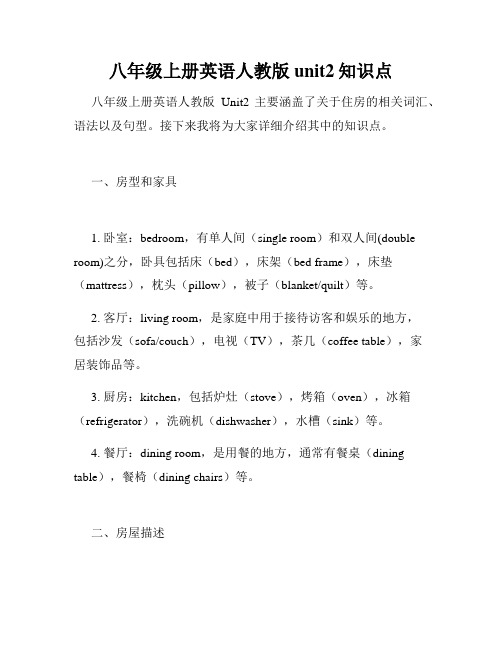
八年级上册英语人教版unit2知识点八年级上册英语人教版Unit2主要涵盖了关于住房的相关词汇、语法以及句型。
接下来我将为大家详细介绍其中的知识点。
一、房型和家具1. 卧室:bedroom,有单人间(single room)和双人间(double room)之分,卧具包括床(bed),床架(bed frame),床垫(mattress),枕头(pillow),被子(blanket/quilt)等。
2. 客厅:living room,是家庭中用于接待访客和娱乐的地方,包括沙发(sofa/couch),电视(TV),茶几(coffee table),家居装饰品等。
3. 厨房:kitchen,包括炉灶(stove),烤箱(oven),冰箱(refrigerator),洗碗机(dishwasher),水槽(sink)等。
4. 餐厅:dining room,是用餐的地方,通常有餐桌(dining table),餐椅(dining chairs)等。
二、房屋描述1. 地理位置:the location of the house。
例如:Our new house is located at the heart of the city.2. 房屋类型:the type of the house。
例如:She lives in a two-story house with a garden.3. 房屋朝向:the orientation of the house。
例如:Our house faces east, so we can enjoy the sunrise every morning.4. 房间大小:the size of the room。
例如:The living room is spacious enough to accommodate a large sofa and a coffee table.5. 装修风格:the style of the decoration。
人教版八年级英语上册第二单元知识点

人教版八年级英语上册第二单元知识点摘要:I.单元简介A.单元主题B.单元目标C.单元结构II.词汇与语法A.词汇1.名词2.动词3.形容词4.副词B.语法1.一般现在时2.一般过去时3.一般将来时III.句型与对话A.句型1.疑问句2.祈使句3.感叹句B.对话1.日常问候与介绍2.家庭与朋友3.学校生活IV.阅读理解A.文章概述B.问题与解答V.听力理解A.听力材料B.问题与解答VI.写作训练A.写作主题B.写作要求C.写作示例VII.单元总结A.重点知识点回顾B.学习建议正文:人教版八年级英语上册第二单元以日常交际为主题,通过各种语言技能训练,帮助学生掌握基本的日常英语交流能力。
本单元的目标是让学生学会使用一般现在时、一般过去时和一般将来时表达现在、过去和未来的情况,同时学习并运用各种词汇、语法、句型和对话,提高学生的英语综合素质。
一、词汇与语法本单元的词汇包括名词、动词、形容词和副词。
学生需要掌握这些词汇的用法,以便在实际交流中准确表达意思。
在语法方面,本单元主要教授一般现在时、一般过去时和一般将来时,帮助学生更好地描述日常生活中的各种情况。
二、句型与对话本单元介绍了疑问句、祈使句和感叹句等句型,以及日常问候与介绍、家庭与朋友、学校生活等场景的对话。
学生需要熟练掌握这些句型和对话,以便在实际交流中更加自信地表达自己。
三、阅读理解本单元的阅读理解部分提供了多篇与主题相关的文章,学生需要通过阅读这些文章,理解文章内容,并回答相关问题。
这有助于提高学生的阅读理解能力,培养他们的英语思维。
四、听力理解听力理解部分为学生提供了与主题相关的听力材料,学生需要听懂材料内容,并回答相关问题。
通过听力训练,学生可以提高自己的听力水平,更好地理解和运用英语。
五、写作训练本单元的写作训练要求学生根据主题进行写作,学会用英语表达自己的观点和想法。
通过写作训练,学生可以巩固所学知识,提高自己的英语写作能力。
总之,本单元为学生提供了一个全面、系统的英语学习环境,通过各种语言技能训练,帮助学生掌握基本的日常英语交流能力。
人教版八年级上册英语Unit 2知识点梳理及语法讲义(学生版)
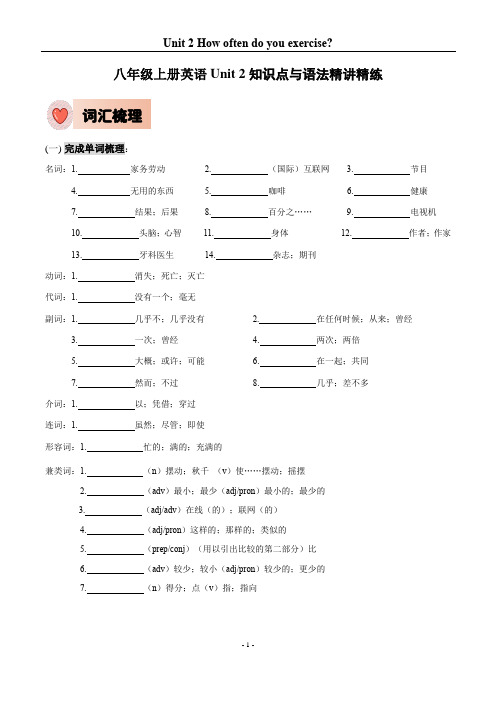
八年级上册英语Unit 2知识点与语法精讲精练词汇梳理(一)完成单词梳理:名词:1. 家务劳动 2. (国际)互联网 3. 节目4. 无用的东西5. 咖啡6. 健康7. 结果;后果8. 百分之……9. 电视机10. 头脑;心智11. 身体12. 作者;作家13. 牙科医生14. 杂志;期刊动词:1. 消失;死亡;灭亡代词:1. 没有一个;毫无副词:1. 几乎不;几乎没有 2. 在任何时候;从来;曾经3. 一次;曾经4. 两次;两倍5. 大概;或许;可能6. 在一起;共同7. 然而;不过8. 几乎;差不多介词:1. 以;凭借;穿过连词:1. 虽然;尽管;即使形容词:1. 忙的;满的;充满的兼类词:1. (n)摆动;秋千(v)使……摆动;摇摆2. (adv)最小;最少(adj/pron)最小的;最少的3. (adj/adv)在线(的);联网(的)4. (adj/pron)这样的;那样的;类似的5. (prep/conj)(用以引出比较的第二部分)比6. (adv)较少;较小(adj/pron)较少的;更少的7. (n)得分;点(v)指;指向(二) 词汇变形小结:1. one (num. 一) — (adv. 一次) — (第一)2. two (num. 二) — (adv.两次)— (第二)3. swing (v. 使……摆动) — (过去式)4. little (adj. 少的) — (比较级:更少的) — (最高级:最少的)5. health (n. 健康) — (adj. 健康的) — (adv. 健康地)— (反义词:不健康的) — (反义词:不健康地)6. die (v. 死) — (n. 死亡) — (adj. 垂死的) — (adj. 死的)7. write (v. 写) — (n. 作者;作家)【练一练】用所给词的适当形式填空1.Most parents don’t think it is ______________(health)for children to stay up too late at night.o She is a great ______________(write)and he’s especially famous for his play, Teahouse.3.If people don’t exercise, the illness can go into their ______________ (body) easily.4.It takes ______________(little)time to go there by underground than by bus.5.Jim got ten ______________ (point)in the basketball match.6.Take the medicine______________(two) a day, and you’ll feel better.7.Jack ______________(do) his homework every day.8.Mr. Li______________(teach) English in our school five years ago.9.At______________(little)ten students were late for school this morning.10.Many boys like playing football because they think it’s______________(relax).(三) 短语攻关:在周末上网几乎从不多久一次一周一次一周两次一周四到六次使用互联网去看电影熬夜至少对……有好处做运动打网球在某人的空闲时间去看牙医摇摆舞做家务垃圾食品例如怎么会呢?……的答案多于少于知识点梳理1.help with housework 帮忙做家务【用法详解】help sb with sth 表示在某方面帮助某人(帮助某人做某事),with后常跟名词或代词作宾语。
Unit+2知识点解析+2024-2025学年人教版八年级英语上册+

Unit 2 How often do you exercise重点单词1.exercise (v./n.) 练习,锻炼例句:I exercise every day to keep fit.(我每天锻炼以保持健康。
)2. housework (n.) 家务活例句:I often help my parents with housework.(我经常帮父母做家务。
)3. hardly (adv.) 几乎不例句:I hardly ever watch TV during weekdays.(在工作日,我几乎不看电视。
)4. once/twice (adv.) 一次/两次例句:I go to the gym once a week.(我每周去一次健身房。
)5. Internet (n.) 互联网例句:I often use the Internet to study.(我经常用互联网来学习。
)6. swing dance (n.) 摇摆舞例句:My grandma likes to dance swing dance.(我奶奶喜欢跳摇摆舞。
)7. free (adj.) 有空的,自由的例句:I'm free this afternoon, so I can help you with your homework.(我今天下午有空,可以帮你做作业。
)8. camping (n.) 野营例句:We plan to go camping next weekend.(我们计划下周末去野营。
)9. popular (adj.) 流行的,受欢迎的例句:Basketball is the most popular sport in our school.(篮球是我们学校最受欢迎的运动。
)dentist (n.) 牙医应用例句:I have to go to the dentist for a checkup.(我得去看牙医做检查。
Unit 2单元知识点 人教版八年级英语上册
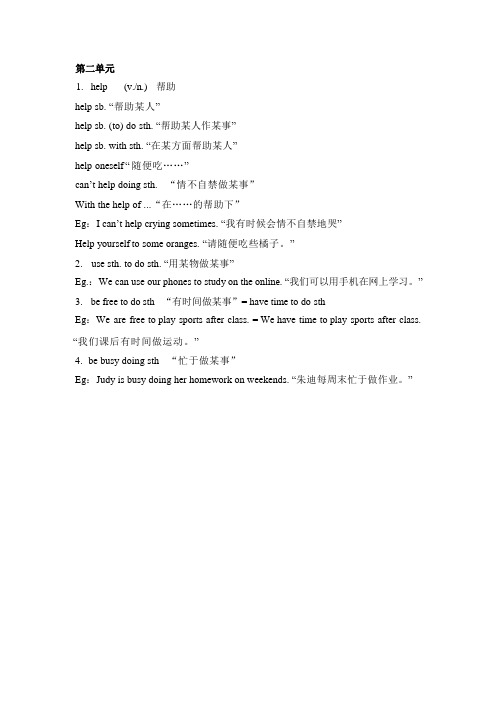
1. help (v./n.) 帮助help sb. “帮助某人”help sb. (to) do sth. “帮助某人作某事”help sb. with sth. “在某方面帮助某人”help oneself “随便吃……”can’t help doing sth. “情不自禁做某事”With the help of ...“在……的帮助下”Eg:I can’t help crying sometimes. “我有时候会情不自禁地哭”Help yourself to some oranges. “请随便吃些橘子。
”2. use sth. to do sth. “用某物做某事”Eg.:We can use our phones to study on the online. “我们可以用手机在网上学习。
”3. be free to do sth “有时间做某事”= have time to do sthEg:We are free to play sports after class. = We have time to play sports after class.“我们课后有时间做运动。
”4. be busy doing sth “忙于做某事”Eg:Judy is busy doing her homework on weekends. “朱迪每周末忙于做作业。
”5. A be full of B = A be filled with B“A 里面装满了B”Eg:The bottle is full of water.= The bottle is filled with water. “瓶子里面装满了水。
”6. What about = how about …… “……怎么样?”about 作为介词,后面人称代词要用宾格,动词要用ing 形式。
Eg :What about listening to music.= How about listening to music. “听音乐怎么样?ℽ7. Play 在表示球类、棋牌类名词前不加t he ,在乐器名词前必须加t he。
八年级上册英语unit2知识点归纳人教版
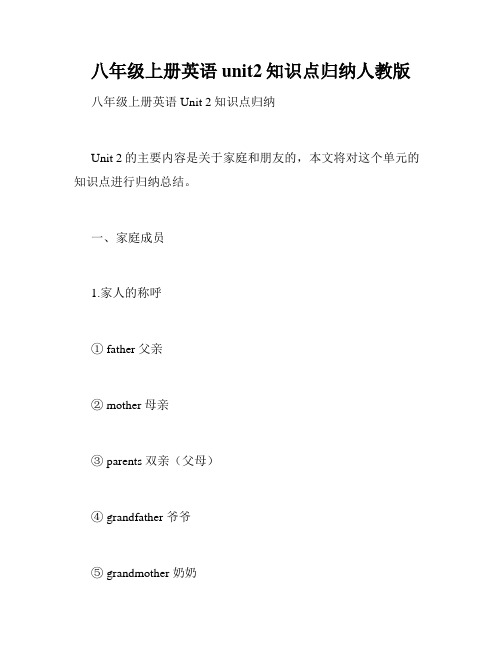
八年级上册英语unit2知识点归纳人教版八年级上册英语Unit 2知识点归纳Unit 2的主要内容是关于家庭和朋友的,本文将对这个单元的知识点进行归纳总结。
一、家庭成员1.家人的称呼① father 父亲② mother 母亲③ parents 双亲(父母)④ grandfather 爷爷⑤ grandmother 奶奶⑥ grandparents 祖父母(外公外婆或者爷爷奶奶)⑦ son 儿子⑧ daughter 女儿⑨ children 孩子⑩ elder brother 哥哥⑪ younger brother 弟弟⑫ elder sister 姐姐⑬ younger sister 妹妹2.家庭成员的职业father:teacher, doctor, businessman, worker…mother:nurse, musician, artist, housewife…grandfather / grandmother:retired, farmer, scientist, writer…brother / sister:student, athlete, musician, artist, …二、家务1.厨房用具① microwave 微波炉② refrigerator 冰箱③ stove 火炉④ oven 烤箱⑤ blender 搅拌器⑥ toaster 烤面包机⑦ kettle 水壶2.家务动词① cook 做饭② wash the dishes 洗碗③ sweep 扫地④ mop 拖地⑤ clean the bathroom 打扫浴室⑥ make the bed 整理床铺⑦ do the laundry 洗衣服三、朋友1.朋友类型① best friend 最好的朋友② close friend 亲密的朋友③ new friend 新朋友④ childhood friend 童年时的朋友⑤ schoolmate 同学2.谈论朋友的习惯和特点① He / She is always there for me. 他 / 她总是在我身边。
人教版八年级上册英语 Unit 2 词汇和语法基础(解析版)
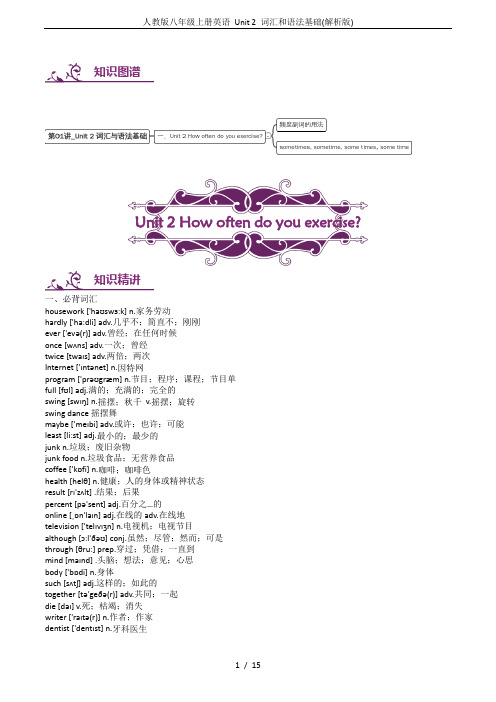
知识图谱Unit 2 How often do you exercise?知识精讲一、必背词汇housework ['haʊswɜːk] n.家务劳动hardly ['haːdli] adv.几乎不;简直不;刚刚ever ['evə(r)] adv.曾经;在任何时候once [wʌns] adv.一次;曾经twice [twaɪs] adv.两倍;两次Internet ['ɪntənet] n.因特网program ['prəʊgræm] n.节目;程序;课程;节目单full [fʊl] adj.满的;充满的;完全的swing [swɪŋ] n.摇摆;秋千v.摇摆;旋转swing dance摇摆舞maybe ['meɪbi] adv.或许;也许;可能least [liːst] adj.最小的;最少的junk n.垃圾;废旧杂物junk food n.垃圾食品;无营养食品coffee ['kɒfi] n.咖啡;咖啡色health [helθ] n.健康;人的身体或精神状态result [rɪ'zʌlt] .结果;后果percent [pə'sent] adj.百分之…的online [ˌɒn'laɪn] adj.在线的adv.在线地television ['telɪvɪʒn] n.电视机;电视节目although [ɔːl'ðəʊ] conj.虽然;尽管;然而;可是through [θruː] prep.穿过;凭借;一直到mind [maɪnd] .头脑;想法;意见;心思body ['bɒdi] n.身体such [sʌtʃ] adj.这样的;如此的together [tə'geðə(r)] adv.共同;一起die [daɪ] v.死;枯竭;消失writer ['raɪtə(r)] n.作者;作家dentist ['dentɪst] n.牙科医生magazine ['mægəziːn] n.杂志however [haʊ'evə(r)] adv.然而;无论如何;不管多么than [ðən] conj.比almost ['ɔːlməʊst] adv.几乎;差不多none [nʌn] pron.没有人;没有任何东西,毫无less [les] adj.更少的;较少的point [pɔɪnt] n.看法;要点;重点;小数点;目标;分数二、重点词汇1. program noun /ˈprəʊ.ɡræm/a series of instructions that can be put into a computer in order to make it perform an operation(计算机)程序;编码指令1). She’s written a program to find words that frequently occur together.她设计了一个程序以便找到经常一起出现的词语。
(新版)人教版八年级上册Unit 2 课文考点总结
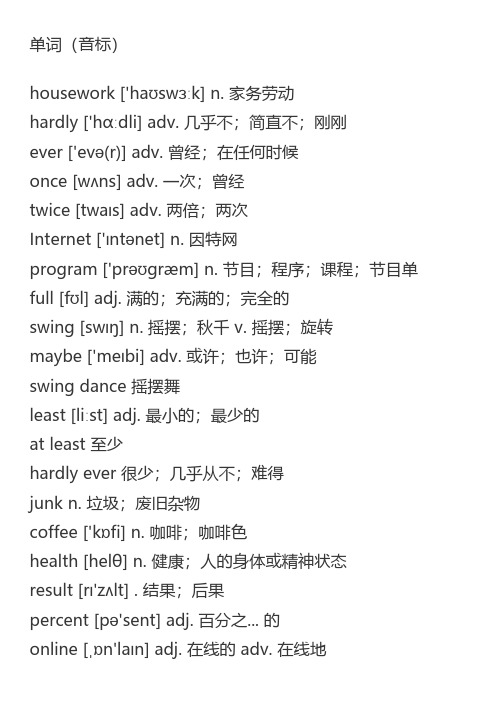
单词(音标)housework ['haʊswɜːk] n. 家务劳动hardly ['hɑːdli] adv. 几乎不;简直不;刚刚ever ['evə(r)] adv. 曾经;在任何时候once [wʌns] adv. 一次;曾经twice [twaɪs] adv. 两倍;两次Internet ['ɪntənet] n. 因特网program ['prəʊɡræm] n. 节目;程序;课程;节目单full [fʊl] adj. 满的;充满的;完全的swing [swɪŋ] n. 摇摆;秋千 v. 摇摆;旋转maybe ['meɪbi] adv. 或许;也许;可能swing dance 摇摆舞least [liːst] adj. 最小的;最少的at least 至少hardly ever 很少;几乎从不;难得junk n. 垃圾;废旧杂物coffee ['kɒfi] n. 咖啡;咖啡色health [helθ] n. 健康;人的身体或精神状态result [rɪ'zʌlt] . 结果;后果percent [pə'sent] adj. 百分之... 的online [ˌɒn'laɪn] adj. 在线的 adv. 在线地television ['telɪvɪʒn] n. 电视机;电视节目although [ɔːl'ðəʊ] conj. 虽然;尽管;然而;可是through [θruː] prep. 穿过;凭借;一直到body ['bɒdi] n. 身体mind [maɪnd] . 头脑;想法;意见;心思such [sʌtʃ] adj. 这样的;如此的together [tə'ɡeðə(r)] adv. 共同;一起die [daɪ] v. 死;枯竭;消失writer ['raɪtə(r)] n. 作者;作家dentist ['dentɪst] n. 牙科医生magazine ['mæɡəziːn] n. 杂志however [haʊ'evə(r)] adv. 然而;无论如何;不管多么than [ðən] conj. 比almost ['ɔːlməʊst] adv. 几乎;差不多none [nʌn] pron. 没有人;没有任何东西,毫无less [les] adj. 更少的;较少的point [pɔɪnt] n. 看法;要点;重点;小数点;目标;分数such as 例如;诸如junk food n. 垃圾食品;无营养食品more than 超过;多于;不仅仅;非常less than 不到;少于Claire 克莱尔Sue 苏American Teenager 《美国青少年》课文(课文中划线部分为重点词组和句型)Section AJack:Hi, Claire, are you free next week?Claire:Hmm... next week is quite full for me, Jack.Jack:Really?How come?Claire:I have dance and piano lessons.Jack:What kind of dance are you learning?Claire:Oh, swing dance. It's fun!I have class once a week, every Monday. Jack:How often do you have piano lessons?Claire: Twice a week, on Wednesday and Friday.Jack:Well, how about Tuesday?Claire:Oh, I have to play tennis with my friends. But do you want to come? Jack:Sure!Jack:hi,Claire,你下周有空吗?Claire:嗯.... 下周我有充足的时间, Jack。
初中英语人教新目标八年级上册Unit 2 重要知识点(重点语块+词形变换+重点句子)

八年级英语上册Unit 2重要知识点Section A【重点语块】1.how often多久一次2.go to the movies看电影3.help with housework 帮忙做家务4.go shopping去购物5.hardly ever几乎从不6.once a week每周一次7.three times a week 一周三次8.twice a month一个月两次e the Internet上网10.what kind of什么种类11.swing dance摇摆舞12.stay up late熬夜13.play sports做运动14.at least至少,不少于;起码15.go to bed early早点睡觉16.eat a healthy breakfast 吃健康的早餐17.be full of...充满……18.my favorite program我最喜欢的节目【词形变换】1.hardly adv.几乎不;几乎没有→hard adv.努力地 adj.困难的;艰苦的2.exercise n.锻炼;练习→exercise v.锻炼;运动3.once adv.一次;曾经→one num.(基数词)一;一个→first num.(序数词)第一4.twice adv.两次;两倍→two num.(基数词)二;两个→second num.(序数词)第二5.least adv.& adj.最小(的);最少(的)→ little adv.& adj.小(的);少(的)→less adv.&adj.更小(的);更少(的)6.swing n.摆动;秋千v.(使)摆动;摇摆→swung(过去式)【重点句子】1.—What do you usually do on weekends?I often go to the movies.—你周末通常做什么?—我经常去看电影。
Unit 2知识归纳人教版英语八年级上册
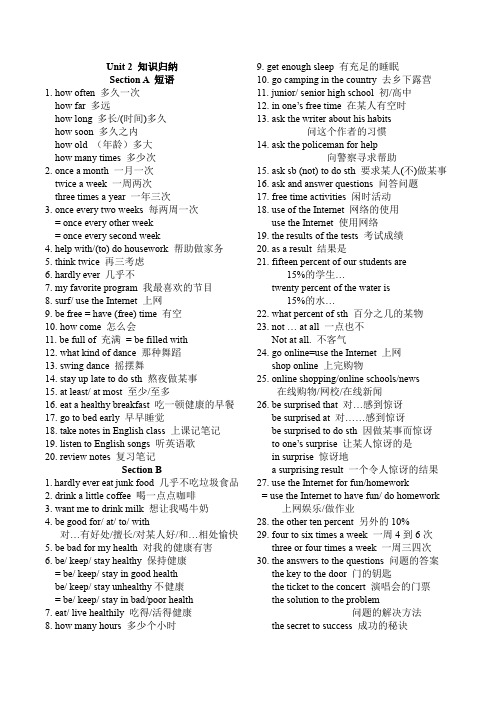
Unit 2 知识归纳Section A 短语1. how often 多久一次how far 多远how long 多长/(时间)多久how soon 多久之内how old (年龄)多大how many times 多少次2. once a month 一月一次twice a week 一周两次three times a year 一年三次3. once every two weeks 每两周一次= once every other week= once every second week4. help with/(to) do housework 帮助做家务5. think twice 再三考虑6. hardly ever 几乎不7. my favorite program 我最喜欢的节目8. surf/ use the Internet 上网9. be free = have (free) time 有空10. how come 怎么会11. be full of 充满= be filled with12. what kind of dance 那种舞蹈13. swing dance 摇摆舞14. stay up late to do sth 熬夜做某事15. at least/ at most 至少/至多16. eat a healthy breakfast 吃一顿健康的早餐17. go to bed early 早早睡觉18. take notes in English class 上课记笔记19. listen to English songs 听英语歌20. review notes 复习笔记Section B1. hardly ever eat junk food 几乎不吃垃圾食品2. drink a little coffee 喝一点点咖啡3. want me to drink milk 想让我喝牛奶4. be good for/ at/ to/ with对…有好处/擅长/对某人好/和…相处愉快5. be bad for my health 对我的健康有害6. be/ keep/ stay healthy 保持健康= be/ keep/ stay in good healthbe/ keep/ stay unhealthy不健康= be/ keep/ stay in bad/poor health7. eat/ live healthily 吃得/活得健康8. how many hours 多少个小时9. get enough sleep 有充足的睡眠10. go camping in the country 去乡下露营11. junior/ senior high school 初/高中12. in one’s free time 在某人有空时13. ask the writer about his habits问这个作者的习惯14. ask the policeman for help向警察寻求帮助15. ask sb (not) to do sth 要求某人(不)做某事16. ask and answer questions 问答问题17. free time activities 闲时活动18. use of the Internet 网络的使用use the Internet 使用网络19. the results of the tests 考试成绩20. as a result 结果是21. fifteen percent of our students are15%的学生…twenty percent of the water is15%的水…22. what percent of sth 百分之几的某物23. not … at all 一点也不Not at all. 不客气24. go online=use the Internet 上网shop online 上完购物25. online shopping/online schools/news在线购物/网校/在线新闻26. be surprised that 对…感到惊讶be surprised at 对……感到惊讶be surprised to do sth 因做某事而惊讶to one’s surprise 让某人惊讶的是in surprise 惊讶地a surprising result 一个令人惊讶的结果27. use the Internet for fun/homework= use the Internet to have fun/ do homework 上网娱乐/做作业28. the other ten percent 另外的10%29. four to six times a week 一周4到6次three or four times a week 一周三四次30. the answers to the questions 问题的答案the key to the door 门的钥匙the ticket to the concert 演唱会的门票the solution to the problem问题的解决方法the secret to success 成功的秘诀31. by watching game shows通过看竞赛类节目32. the most popular 最受欢迎的33. be popular with sb 受…的欢迎34. the best way to relax 放松的最佳方式= the best way of relaxinga good place to have fun 娱乐的好地方35. through exercise/ lots of practice/ hard work通过锻炼/很多练习/辛勤的劳动36. go through the park/door/window穿过公园/门/窗go across the road/ bridge/river过马路/桥/河37. be healthy for the mind and body对身心健康有好处38. change one’s mind 改变某人的想法39. keep … in mind 牢记于心40. make up one’s mind to do sth= decide to do sth 下定决心做某事= make a decision to do sth41. such as playing sports 比如做运动42. for example,+句子例如43. Sb spend T/M on sth/(in) doing sthIt takes sb T to do sthSth cost sb MSb pay (M) for sth44. as/when you play together在你们一起玩的时候45. forget/remember to do sth忘记/记得要做某事forget/ remember doing sth忘记/记得做过某事46. Old habits die hard. 旧习难改47. die-died-dying-dead-death 死48. die of/ from 死于49. go to the dentist= see the dentist 看牙医50. a 16-year-old high school student一位16岁大的中学生51. more than two hours = over two hours两个多小时52. all /none of us 我们所有人都/都不53. both/ neither of them 他们俩都/都不54. either of you 你们俩之一55. less than 10 points 不到10分56. point out 指出57. point to / at 指着58. be afraid of (doing) sth 害怕某物be afraid to do sth 因害怕而不敢做某事重点句型1. How often does she watch TV?(问频率)He hardly ever watches TV. 一般现在时2. How soon will he come back?(问in +时间段) He will come back in an hour. 一般将来时3. He goes to the dentist once a year.(提问) How many times does he go to the dentist every year?He goes to the dentist once a year.(提问) How often does he go to the dentist?4. He may be free next week.(同义句)Maybe he is free next week.5. I sleep eight hours every night.(提问)How many hours do you sleep every night?I sleep eight hours every night.(提问)How long do you sleep every night.6. Here be 倒装句Here is the pencil and some books.Here come s the bus.Here it is./Here they are.7. Although 与but 不能连用,但可换同义句Although he works hard, he doesn’t get good grades. 虽然他很努力,但成绩不好。
人教版八年级上册英语Unit 2 知识点语法归纳总结
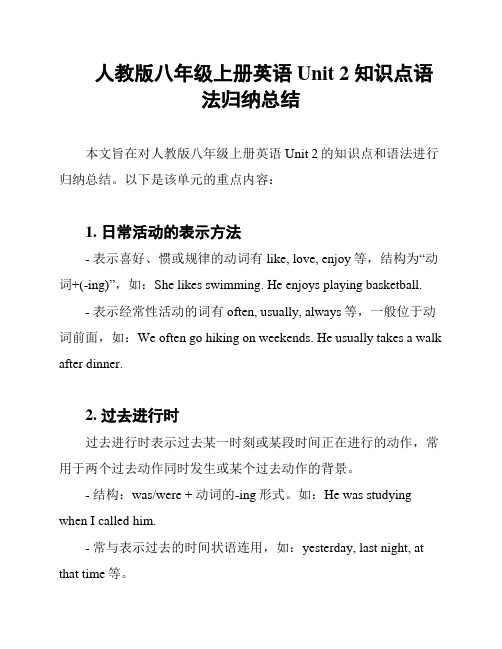
人教版八年级上册英语Unit 2 知识点语法归纳总结本文旨在对人教版八年级上册英语Unit 2的知识点和语法进行归纳总结。
以下是该单元的重点内容:1. 日常活动的表示方法- 表示喜好、惯或规律的动词有like, love, enjoy等,结构为“动词+(-ing)”,如:She likes swimming. He enjoys playing basketball.- 表示经常性活动的词有often, usually, always等,一般位于动词前面,如:We often go hiking on weekends. He usually takes a walk after dinner.2. 过去进行时过去进行时表示过去某一时刻或某段时间正在进行的动作,常用于两个过去动作同时发生或某个过去动作的背景。
- 结构:was/were + 动词的-ing形式。
如:He was studying when I called him.- 常与表示过去的时间状语连用,如:yesterday, last night, at that time等。
3. 被动语态的构成和用法- 构成:be + 过去分词。
如:The book was written by a famous author.- 主动句变被动句的转换方法:将主动句的宾语变为被动句的主语,原主语变为介词"by"的宾语。
如:She eats an apple.(主动句)→ An apple is eaten by her.(被动句)- 被动语态用于强调动作的承受者,或者当我们不知道或不关心动作的执行者是谁时。
4. 双宾语结构有些动词后面既可以跟一个间接宾语,也可以跟一个直接宾语,这种结构称为双宾语结构。
- 结构:动词 + 间接宾语 + 直接宾语。
如:She bought her sister a present.- 常见的双宾语动词有give, send, lend, teach等。
人教版英语八年级上册unit 2

Unit 2 I’ll help to clean up the city parks (一)重点词汇、短语和句型重点单词Section A Cheer v.欢呼,喝彩Volunteer v.义务做,自愿做Lonely adj.孤独的,寂寞的Felling n.感觉,感触Joy n.高兴,愉快Journey n.(尤指长途)旅行Alone adv.独自,单独Notice n.通知,通告Several pron.几个,一些Satisfaction n.满足,满意Owner n.物主,主人Sign n.标志,信号Raise v.募集,征集重点单词Section B Repair v.修理,修补Letter n.信,函Blind adj.瞎的,失明的Imagine v.想象,设想Open v打开Carry n.拿;提;扛Excited adj.激动的,兴奋的Kindness n仁慈,善良Understand v.理解,领会Disabled adj.丧失能力的,有残疾的Sir n.先生Fix v.修理,安装Wheel n.车轮,轮子Miss n.女士,小姐Deaf adj.聋的Difficulty n.困难,难题Door n.门Train v.训练,培训Training n.训练,培训Clever adj.聪明的Change v.&n.变化;改变Madam.夫人,女士重点短语Section A Clean up打扫(或清除)干净Give out分发;散发Give away赠送;捐赠Make a difference影响;有作用Put up张贴Care for关怀,照顾Hand out分发;发放Cheer up(使)变得高兴起来,振奋起来Used to曾经。
过去。
Set up建起,设立Put off推迟,拖延Come up with提出,想出At the same time同时Be worried about担心重点短语Section B Run out of用光Fix up修理;修补Be similar to与。
- 1、下载文档前请自行甄别文档内容的完整性,平台不提供额外的编辑、内容补充、找答案等附加服务。
- 2、"仅部分预览"的文档,不可在线预览部分如存在完整性等问题,可反馈申请退款(可完整预览的文档不适用该条件!)。
- 3、如文档侵犯您的权益,请联系客服反馈,我们会尽快为您处理(人工客服工作时间:9:00-18:30)。
Unit2 How often do you exercise?一·重点单词用法1. housework 家务 [U]do housework 做家务做家庭作业:do homework2. hardly 几乎不 adv. 表频率hard adv. 努力地 study hard 努力学习adj. 困难的,坚硬的 It's hard to do sth.做某事很困难3. once/ twice/ three times 一次/两次/三次对频率提问用“ how often”4. Internet 互联网on the Internet 在网上surf the Internet 网上冲浪5. full n. 忙的,满的,饱的eg. Next week is full for me. 下周我很忙。
I'm full now. 我现在饱了。
The cup if full of water. 瓶子里装满了水。
be full of 充满......6. maybe adv. 大概,或许,可能Maybe you are right.may be 情态动词+be结构可能是You may be right.7. least adv. 最少,最小(最高级)比较级:less 原级:littleat least 至少,不少于8. health n. 健康healthy adj. 健康的healthily adv. 健康地keep/stay/be healthy= keep in good healtheg. We eat healthy food. 我们吃健康的食物。
We eat healthily.我们吃地健康。
It's good for our health. 它对我们的健康有好处。
10. percent 百分之...90%: ninety percent11. online 在线的go online 上网buy sth. online 网上买某物12.although 虽然,尽管=though(引导让步状语从句),不能与but连用eg. Although my grandpa is old, he looks healthy.尽管我的爷爷老了,但是他看起来很健康。
13. through 以,穿过,凭借through 从空间内部穿过across 从某物表面穿过over 从某物上方越过eg. walk though the forest 穿过森林across the road 穿过马路fly over the house 飞过房子14. mind n. 头脑,心智v. 介意,反对+doingDo you mind opening the window? 你介意打开窗子吗?15. such as...... 例如,像...一样,一般用于举例子16. die v. 消失,死亡过去式:died 现在分词:dyingn. death 死亡 adj. dead 没有生命的17. writer n. 作者,作家 V. write 写18. however 然而,不过,但是however 不能连接两个句子,另起新句,永逗号隔开 but 前后连接两个分句,表示转折19. point 得分,点get 100 points 得100分one point five 1.5v. 指向point at/ to 指向......二.课文重点:1.on weekends 在周末on the weekend 在周末,特指某个周末2. help with housework 帮助做家务help with sth. 帮助做某事help sb. with sth.=help sb. to do sth. 帮助某人做某事 help oneself 随便吃,款待3. sometimes 有时候(how often提问)some times 几次,几倍(how many times提问)sometime 某个时候(when提问)some time 一段时间(how long提问)4. how often 多久一次how long 多长时间/距离how far 多远how soon 多久以后how many 多少how much 多少、多少钱5. use 使用use sth. to do sth. 用某物做某事6. What's your favorite......?=What...do you like best?7. free 空闲的,自由的,免费的 freedom n. 自由be free 有空,闲着=have timebe free to do sth. 自由地做某事8. have lessons 上课have a/an...lesson 上...课do one's lesson 做功课give/teach sb. a lesson 给某人一个教训9. want 想要want to do sth. 想要做某事want sth. 想要某物want to be 想要成为want sb. to do sth. 想要某人做某事10. be good for 对......有益、好处be good at 擅长be good with 善于应付be good to 对......友好11. ask 询问,问ask sb. about sth. 问某人关于某事的情况ask sb. to do sth. 让/要求某人做某事ask sb. for sth. =ask for sth. from sb. 向某人要某物12. the answer to the question ...问题的答案the way to ..... 去.....的路The key to ... ...的钥匙13. 花费spend .....on sth. /in doing sth. 花费...在某物上/做某事It takes sb some time to do sth. 花费某人...做某事pay...for sth. 支付...买某物Sth. cost...... 某物花费...14. 也too 用于肯定句句末also 用于肯定句句中either 用于否定句句末15. afraid 担心,害怕be afraid to do sth. 害怕去做某事be afraid of sb./sth. 害怕be afraid of doing sth. 害怕做某事I'm afraid that+句子eg. afraid of the dark 怕黑afraid of asking questions 怕问问题I'm afraid that I have to go now.恐怕我现在得走了。
三.重点短语1.help with housework 帮助做家务2.go shopping 去买东西3.on weekends 在周末4.how often 多久一次5.hardly ever 几乎从不6.once a week 每周一次7.a month 每月两次8.go to the movies 去看电影9.every day 每天 e the Internet 使用因特网11.be free 有空12.have dance and piano lessons 上舞蹈课和钢琴课13.swing dance 摇摆舞 14.play tennis 打网球15.stay up late 熬夜 16.at least 至少17.go to bed early 早点睡觉 18.play sports 进行体育运动19.be good for 对...有好处 20.go camping 去野营21.in one’s free time 在某人的业余时间22.not... At all 一点也不23.the most popular 最受欢迎的24.such as 例如,好像 25.go to the dentist 去看牙医26.more than 多于 27less than 少于28.how about...?=what about...? ...怎么样?29.spend time with sb. 和某人一起度过时光30.ask sb about sth 向某人询问某事31.by doing sth. 通过做某事32.the best way to do sth. 做某事的最好方式四.重点句型1.What do you usually do on weekends?I always exercise.2.What do they do on weekends?They often help with housework.3.What does she do on weekends?She sometimes goes shopping.4.How often do you go to the movies?I go to the movies maybe once a month.5.How often does he watch TV?He hardly ever watches TV.6.Do you go shopping?No, I never go shopping.7.How many hours do you usually sleep at night?Eight or more.五.单元语法:频度副词1.频度副词含义:(1)表示次数,频率的副词成为频度副词。
Always(总是)>usually(通常)>often(经常)>sometimes(有时)>seldom(很少)>hardly ever(几乎不)>never(从不)(2)表示具体的频率,次数时,一次用once, 两次用twice,三次以上用“基数词+times”.Eg. He always comes late. 他总是迟到。
I play soccer twice a week. 我一周踢两次足球。
2.频度副词在句中的位置:一般用在实义动词之前,be动词,助动词或情态动词之后,有时为了强调,也可置于句首。
Eg. We never eat junk food. 我们从不吃垃圾食品。
Lucy is sometimes very busy. 露西有时很忙。
Sometimes Jack plays computer games.有时杰克玩电脑游戏。
* always一般不用于句首,但可用于祈使句中。
